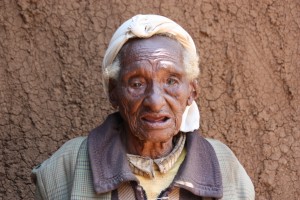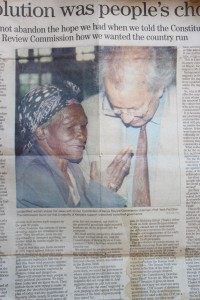
Today Thursday August 27th 2015 marks exactly five years since the promulgation of the new constitution. As Kenyans take stoke of the document that heralded the legal reforms that had for long been desired in the country, there is a woman who must not be forgotten, for she is the symbolic figure of why the Constitution was associated with ‘Wanjiku’.
That woman is one Monica Wangui Kamau of Kiwanja Cha Ndege in Njoro Sub County, Nakuru. Wangui was a common figure during the process of the search for the new law from the days of the Commission that was led by Prof. Yash Pal Ghai to the days of the Committee of Experts (CoE) that was led by Nzamba Kitonga.
Many Kenyans will remember her images in many dailies as she met either with Prof. Ghai to present her views or as she devoured a copy of the law which was on the proposed document. In a very significant way she represented the average Kenyan whose issues the Constitution aimed to address.
“I was born during the age set of Kamande,”
an ever jovial Wangui told me at her home in that authentic style in which dates of birth were given in the old times. Her identity card reads she was born in Thika in 1907.
“I don’t know about your academic years,”
Wangui, a Mau Mau veteran who speaks of the emergency war with emotions adds, before stating why she too wanted reforms in the country.
“The first constitution was dictatorial,”
she says almost reminiscing what she personally went through in the colonial days and the later days of post independence Kenya – but mainly during the days of Daniel Moi whose reign she does not celebrate at all due to the land conflicts that characterized his days in State House.
But today, Wangui, the symbolic figure that is the ‘Wanjiku of the Constitution’ feels not much has been achieved with the law that she so much looked forward to.
“The constitution is okay but it is not being followed,”
she tells me in an interview, stopping to rub her eyes before staring at me with a finality that speaks of the seriousness in her voice.
“I feel like the President (Uhuru Kenyatta) is doing well but his commanders are letting him down,”
by which she means the County Governments, but more specifically the Governors.
“County governments are using us, citizens, like a toilet paper,”
she says while explaining that county governments are not doing well in the implementation of devolution.
Wangui is unhappy with the wrangles between county governments and the national government that have characterized the close to three years that governors have been in office. This she feels is the greatest challenge facing the implementation of the devolved system of government which is one of the key gains that has been pointed out in the new Constitution.
Actually in one of the newspaper cuttings that Wangui keeps is one with an article by Sarah Elderkin entitled ‘Devolution was people’s choice’. The article runs with a photo she had with Prof. Ghai.

And apart from decrying what she feels is the poor implementation of devolution, Wangui says there are several other issues that have not turned out to be how she had dreamt. Key among them is patriotism and she wonders why Kenyans have not been inspired to love their country even more by the new Constitution. This she feels is responsible for the many evils committed by both leaders and citizens.
“During the colonial days we had collaborators. Today we still have such people who persecute the country by evil ways. I feel like the colonial government is coming back.”
“Despite having the new constitution we still have greedy people in the country, like the ones who sell people illicit liquor,” she added.
Wangui also wonders why Kenyans have not ended the beast of corruption fully through the new law or even insecurity.
“Why do we get attacked by terrorists yet we have a new Constitution?”
she asked calling to mind the terror attacks the country has gone through in recent times.
“Does this Constitution take care of the needs of the welfare of the poor like street children?”
she also posed saying that for reasons she does not know, she had not received her monthly stipend as an elderly for months.
On land and the welfare of Mau Mau veterans she asked if the Constitution recognizes their existence.
“If there is justice, how come we still have Mau Mau veterans without land?”
she said alleging that Mau Mau veterans currently residing in the Rift Valley did not get a share of the money that was issued by the British government as compensation to the crimes that took place during the emergency.
Wangui is a mother of 22 and while talking of her children she counts with her fingers “one, two, three” in Gikuyu then jumps to 22 which she pronounces in English but in an expression that is sugar coated in her mother tongue.
“All those came from this,”
she says pointing at her tummy as a way of saying that although she may be having a frail structure she is still strong.
Listening to her throughout the interview that took close to three hours, I discovered we might be quick in doing an elitist counting of the gains of the five years of the Constitution without taking time to reflect how those gains have cascaded to the grass roots.

